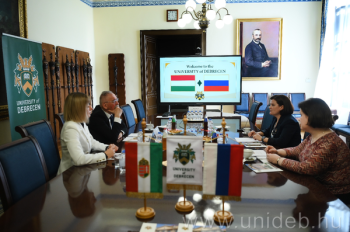Viktória Jeney, senior research fellow at the Molecular Medicine research centre of the Faculty of Medicine , University of Debrecen, and Orsolya Valkó, of the Faculty of Biology and Ecology at the Faculty of Science and Technology , University of Debrecen, were awarded financial support for their respective research teams.
-The aim of the „Lendület” (Momentum) programme is to attract and keep in Hungary outstanding young talents with excellent performance. Over the ten years since the launch of the programme 10 „Lendület” groups at the University of Debrecen have been awarded financial support, and the results have confirmed the programme’s objectives. This year UD’s two, particularly successful young researchers have been given further opportunities to continue their previous research work, László Csernoch told hirek.unideb.hu. The programme focuses on jointly supporting excellence and mobility, vice rector for academic affairs of UD said.
The work of physician-scientist Viktória Jeney can contribute to a better understanding of the mechanism of atherosclerosis. The focus of her studies is the epigenetic, transcriptional, and metabolic regulation of osteocondrogenic transdifferentiation in vascular calcification. Atherosclerosis is a condition that affects everybody as they age. It is not a modern phenomenon, since, as confirmed by recent research on mummies, it affected the inhabitants of ancient Egypt, too. In spite of the fact that athresclerosis is closely linked to cardiovascular mortality, no effective prevention is available as yet. It has long been known that in atherosclerosis the substance that is deposited in vessel walls is similar to bone; however, the way it is formed has only recently been discovered.
Researchers have proved that, during atherosclerosis, smooth muscle cells originally present in the vessel wall are tranformed into bone-producing cells. Viktória Jeney’s aim is to explore the mechanisms that are responsible for this transformation. To find answers to her questions, she uses up-to-date, never-before used methods, and is planning to develop novel therapeutic options based on the information obtained.
Ecologist Orsolya Valkó is searching for answers to the question how the wealth of species and resilience of ecosystems can be maintained by reinterpreting seed bank, seed distribution and settlement dynamics. The aim of the research group at the University of Debrecen is to find solutions to the long-term maintenance of the biodiversity and functioning of grassland ecosystems by finding out more about the role of seeds in ecosystems. Covering close to 40% of the earth’ s land area, grasslands are particularly species-rich and varied communities, providing home and livelihood for more 250 million people. In extremely dynamic grassland communities seeds simultaneously ensure the spreading, settlement and long-term survival of species. In their series of studies, the research group investigates the role of seed bank, seed propogation and settlement processes in community organisation. They use their results to work out a seed-based nature conservation strategy that will enhance maintenance of the biodiversity of natural habitats as well as the efficiency of the reconstruction of degraded habitats.
Source: mta.hu
Press Office


